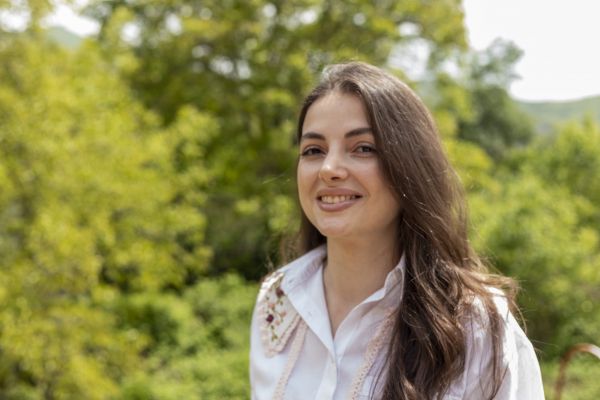Mari Tevosyan from Tatev Community Strives to Carry out Gender-Equal and Youth-Centered Activities in Syunik

Mari Tevosyan is from the Tatev community of the Syunik region. She has been involved in the local government sector since 2019, initially as an adviser to the community head and now as chief of staff. Over the past five years, she has been trying to foster a “gender-sensitive, gender-equal, and youth-centered” environment in her community. For this purpose, in 2019, she co-founded the “Eco-Youth” public organisation with a friend, focusing on youth, environmental protection, and tourism as its core.
“When we first began our activities, we applied for grants to various donors, but we were unsuccessful. Everyone expected to see visible outcomes from our programmes, without considering our strong desire to make positive change in our community. We applied to a funding competition announced within the framework of the EU-funded “Student Democracy” programme, which is handled by the Eurasian Cooperation Foundation, despite our belief that they will prioritise field leaders. It was a big surprise when we received a letter approving our programme”, Mari admits.
The goal of the “ReGorsU: Student Council Re-equipment as a University Restart” project is to contribute to the strengthening of the capacities of Goris State University’s Student Council and its members, to promote the launch of activities, and to increase the role of students in the decision-making process at the university. Mari was the president of the GSU student council during her student years and was aware of the issues it was facing. Mari states that ‘this tiny programme is of great strategic value’ and that with it the organisation’s geography has grown to include members of the student council of Goris State University from various Syunik communities.
Mari is optimistic that their initiatives will contribute to the establishment of their dream neighbourhood, region, and country. “We have a team of like-minded people working with us and sharing our aspirations and visions. The organisation’s members-volunteers come not only from the Tatev community but also from other settlements in Syunik and other regions of Armenia”. She goes on to say that their number at this point is around 25 people.
Within the scope of the programme performed by the NGO “Eco-Youth”, a student gathering was already organised, during which the members of the GSU Board of Directors obtained the needed information and skills to engage the student council and become part of the university administration. It is intended to arrange experience exchange sessions at Shirak and Vanadzor state universities in the near future, as well as an expert review of the SC charter and, if necessary, a revision.
According to Mari, they expect to solve several problems with this programme, which began in February 2023. “To contribute to the student council launching of the activity and ensure its visibility, to raise students’ awareness of university management and the development of student-centered policies, to consider the student council’s statutes, and, if necessary, carry out revision by the relevant specialist”, she says.
Reviewing the activity of the non-governmental organisation she founded, Mari notes that EU support helped them make great progress.
“The money we received became a cornerstone and, because we thought our initiative and ideas were valuable and vital, we chose to work faster, and the grant then became a means of motivating us not to be dissatisfied and to keep battling. My friends are also participants of many EU-funded programmes who benefit from personal growth, travel to different European countries, learn from their experiences, and implement various projects and campaigns in their areas. Now, as the European Union invests heavily in numerous fields in Syunik, the conviction to stay, fight, and make our goals a reality is winning among young people like me”, adds Mari.
In the near future, Mari Tevosyan is planning to implement larger projects, starting with the re-profiling of their organisation. “We want to implement projects in other areas of public life because we clearly see that no one else will come to our community and offer “cure” to our “sorrows”. We are thinking in the direction of developing a social enterprise, which will help to assure the stability of the activity of the public organisation and solve some community issues”, she says.